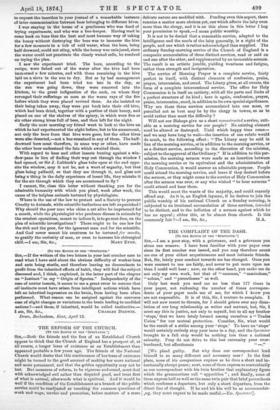THE REFORM OF THE CHURCH.
[TO THE EDITOR OF THE "SPECTATOR."] SIR,—Both the friends and the foes of an Established Church appear to think that the Church of England has a prospect of, at all events, a longer lease of existence as an Establishment than appeared probable a few years ago. The friends of the National Church would desire that this continuance of her lease of existence might be turned to the good account of making her more national and more permanent, and that the golden opportunity may not be lost. But measures of reform, to be vigorous and sound, must deal with acknowledged evil rather than disputed good, and treat first of what is natural, afterwards what is spiritual. And it would be well if the condition of the Establishment as a branch of the public service could be readjusted as touching the common questions of work and wage, service and promotion, before matters of a more
delicate nature are meddled with. Pending even this aspect, there remains a matter more obvious yet, one which affects the laity even more than the clergy, and it is on this alone in this letter I beg your permission to speak,—I mean public worship.
It is not to be denied that a reasonable service, adapted to the intelligence and the needs of the laity generally, is a right of the people, and one which is rather acknowledged than supplied. The ordinary Sunday-morning service of the Church of England is a composite accumulation of three distinct services, read or said on end one after the other, and supplemented by an inexorable sermon. The result is an artistic jumble, yielding weariness and fatigue, rather than strength and invigoration.
The service of Morning Prayer is a complete service, fairly perfect in itself, with distinct elements of confession, praise, prayer, intercession, and creed. The Litany gives, at all events, the form of a complete intercessional service. The office for Holy Communion is in itself an entirety, with all the parts and limbs of a perfect structure of its kind ; here is again, confession, prayer, praise, intercession, creed, in addition to its own special significance. Why are these three services accumulated into one mass, or parcelled out as best may be by the clergy in towns, so as to avoid rather than meet the difficulty ?
Will not our Bishops give us a short reconstructed service, suit- able as a morning service for our people? No existing element need be altered or destroyed. Until which happy time come— and we may have long to wait—the insertion of one rubric would do much, to the following effect : "The Litany may be said in
lieu of the morning service, or in addition to the morning service, or as a distinct service, according to the discretion of the minister, subject to the approval of the Ordinary." If in addition to this per- mission, the morning sermon were made as an insertion between the morning service or its equivalent and the administration of Holy Communion, it would answer an admirable purpose. People could attend the morning service, and leave if they desired before the sermon, or they might come to the service of Holy Communion after the sermon was over, or any who wished "to hear sermons" could attend and hear them.
This would meet the wants of the majority, and could scarcely offend any. As it is, an English layman, if he desires to join the
public worship of his national Church on a Sunday morning, is subjected to an irrational accumulation of three services, intended to be distinct, and to the infliction of a sermon against which he has no appeal ; either this, or be absent from church. Is this
commonly fair ?—I am, Sir, &c., M.A.


































 Previous page
Previous page